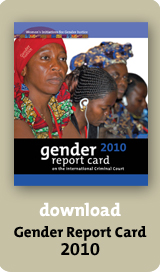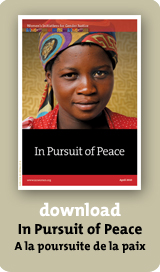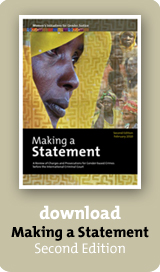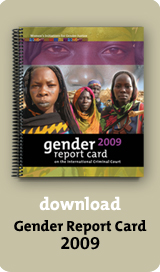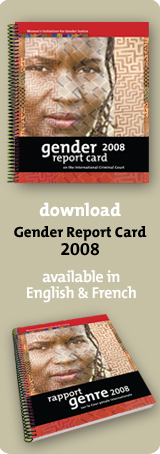E-letter March 2011 |
||
 |
||
In this issue |
Dear Friends,Welcome to the first 2011 issue of Legal Eye on the ICC, a regular e-letter from the Women's Initiatives for Gender Justice. In the Legal Eye you will find summaries and gender analysis of judicial decisions and other legal developments at the International Criminal Court (ICC), and discussion of legal issues arising from victims' participation before the Court, particularly as these issues relate to the prosecution of gender-based crimes in each of the Situations under investigation by the ICC. The Court currently has cases relating to the conflicts in Uganda, the Democratic Republic of the Congo (DRC), Darfur, Sudan, the Central African Republic (CAR) and Kenya. In addition to the Legal Eye on the ICC we also produce Women's Voices, a regular e-letter providing updates and analysis on political developments, strategies for the pursuit of justice, the status of peace talks, and reconciliation efforts from the perspective of women's rights activists from the five conflict situations. With both online e-letters we will also update you about the programmes, legal and political advocacy, campaigns, events, and publications of the Women's Initiatives. More information about the work of Women's Initiatives for Gender Justice and previous issues of Women's Voices and the Legal Eye can be found on our website at www.iccwomen.org. DRC :: Surrender to the Court and initial appearance of MbarushimanaCallixte Mbarushimana, a national of Rwanda, was transferred into the custody of the ICC on 25 January 2011. His is the most recent case in the DRC Situation, and the first case arising out of the Kivus investigation. Mbarushimana was arrested in Paris, France on 11 October 2010, in accordance with a sealed Arrest Warrant issued by the ICC on 28 September 2010,[1] for suspected involvement in crimes against humanity and war crimes committed in the Kivus region of the DRC. Significantly, seven of the 11 charges against Mbarushimana are for gender-based crimes, in particular rape and rape as torture as both a war crime[2] and a crime against humanity,[3] inhumane acts[4] and persecution[5] as crimes against humanity, and inhuman treatment as a war crime.[6] Mbarushimana's intial appearance was held on 28 January 2011 before Pre-Trial Chamber I. Presiding Judge Tarfusser has scheduled the confirmation of charges hearing for 4 July 2011. Read more about Mbarushimana in the Gender Report Card 2010. CAR :: Start of the Bemba trialThe trial against Jean-Pierre Bemba Gombo (Bemba) — the ICC's third trial and the second to include charges for gender-based crimes — commenced on 22 November 2010. Bemba faces two counts of crimes against humanity (murder and rape)[7] and three counts of war crimes (murder, rape and pillaging)[8] for his alleged responsibility, as military commander, for crimes committed by the Mouvement de libération du Congo (MLC) in the CAR. The Bemba trial, the only trial to date arising from the CAR Situation, is the first against a high-profile political figure, and the first in which the accused is charged with command responsibility, including for gender-based crimes. As stated by the Women's Initiatives for Gender Justice: 'The Bemba trial presents an opportunity for the Court to say firstly to women, that crimes of sexual violence are important enough to prosecute those who commit such acts; and secondly to leaders of armed forces and militias, that should they fail to prevent or punish subordinates for gender-based crimes, they will be held accountable.' Bemba, one of the richest men in Congo, is a Congolese national and well-known political figure who served as one of four Vice Presidents of the DRC in its transitional government from 2003–2006. Bemba is the founder and former President and Commander-in-Chief of the MLC. In 2002, CAR President Ange-Félix Patassé invited the MLC into the CAR to help him suppress an attempted coup by a rebel movement led by François Bozizé, former Chief-of-Staff of the CAR armed forces. It was in this context that the MLC forces are alleged to have entered the CAR in October 2002 and launched a campaign of rape, pillaging and murder against the civilian population. When the Women's Initiatives for Gender Justice visited the CAR in 2006, many local women's rights organisations described the brutal nature of the attacks perpetrated against the civilian population by the MLC. They spoke in particular about the widespread campaign of rape, and the repercussions faced by rape victims/survivors in the CAR today, such as rejection by their communities, HIV/AIDS, and serious levels of violence-related trauma.[9] As discussed below, the Bemba case is notable for having the largest number of participating victims to date. Charges for gender-based crimesIn the request for Bemba's Arrest Warrant,[10] the Prosecution sought a broad range of charges of gender-based crimes. Charges were originally sought for rape as a crime against humanity and a war crime; rape as torture as a crime against humanity and a war crime; outrages upon personal dignity as a war crime; and other forms of sexual violence as a war crime and a crime against humanity.[11] These charges as originally formulated would have addressed not only the rapes themselves, but also the pain and suffering experienced by victims/survivors of rape and those forced to watch their family members being raped, as well as the humiliation experienced by victims/survivors who were raped publicly or forced to undress publicly. Unfortunately, in the Bemba case there has been a narrowing of charges at both the arrest warrant and confirmation stages of the proceedings, due to problems with the evidence presented and with the Pre-Trial Chamber's reasoning. In the decision issuing the Arrest Warrant, the Pre-Trial Chamber declined to include charges of other forms of sexual violence as a crime against humanity and a war crime, which related to forcing women to undress in order to publicly humiliate them. The Chamber did not consider the facts presented to be of comparable gravity to other enumerated acts, notwithstanding existing international jurisprudence that contradicts such a finding.[12] In its decision on the confirmation of charges of 15 June 2009, the Pre-Trial Chamber also declined to confirm rape as torture constituting a crime against humanity, and rape and other acts of sexual violence as outrages upon personal dignity. It found that such charges arose from the improper practice of 'cumulative charging', and stated that 'the prosecutorial practice of cumulative charging is detrimental to the rights of the Defence since it places an undue burden on the Defence'.[13] The Chamber also declined to confirm charges of rape as torture constituting a war crime and of other alleged acts of torture as crimes against humanity. In relation to the dismissal of both these charges, the Chamber noted that this was because of a lack of evidence provided by the Prosecution.[14] Read more about the confirmation of charges decision in the Legal Eye on the ICC, July 2009. Amicus curiae briefIn July 2009 the Women's Initiatives for Gender Justice was granted leave to file an amicus curiae brief in the Bemba case. Working with the eminent scholar and practitioner Patricia Viseur Sellers as our legal counsel, the Women's Initiatives argued that cumulative charging, and in particular charging multiple crimes of sexual violence based on the same or similar acts of violence and evidence, is widely exercised in other international criminal tribunals and by many national courts. International jurisprudence on this issue has found it appropriate and necessary to charge each crime contained within specific acts of sexual violence in order to capture the extent of the harm suffered by victims and the multiple purposes of this type of violence in armed conflicts. In addition, the Elements of Crimes of the Rome Statute of the ICC clearly states that a particular conduct may constitute more than one crime.[15] As Brigid Inder, Executive Director of the Women's Initiatives for Gender Justice, stated at the opening of the Bemba trial, 'by dismissing charges of rape as torture, the Chamber overlooked the purpose of the rapes committed by Jean-Pierre Bemba's militia group and it overlooked the extent of the pain and suffering experienced by victims in this case who were raped as well as tortured. The decision also failed to take into account the torture experienced by family members who were forced to watch their loved ones being raped in front of them.'[16] In the amicus curiae brief, the Women's Initiatives argued that, with the dismissal of charges of gender-based crimes, the full extent of the suffering experienced by victims/survivors of sexual violence in the CAR would not be addressed at trial. Read more about the Women's Initiatives for Gender Justice's amicus curiae brief, in the Special Edition of the Legal Eye on the ICC, August 2009 and in the Gender Report Card 2009. Read the Women's Initiatives' amicus curiae brief. Opening statements and witness testimony on sexual violenceIn spite of the narrowing of charges by the Pre-Trial Chamber, the Bemba trial remains significant in the amount of direct testimony on rape that the Court will hear. In filings prior to the start of trial, the Prosecution informed the Trial Chamber that it intended to call 40 witnesses, 14 of whom would testify directly on rape and sexual violence, including two experts.[17] Throughout its opening statement on 22 November 2010, the Prosecution stressed the widespread and devastating nature of the mass rape perpetrated by MLC forces in the CAR. Deputy Prosecutor Fatou Bensouda noted that the crimes 'were not confined to a single location; they occurred whenever MLC soldiers progressed, and they had the official blessing of the MLC hierarchy. Soldiers raped civilians in front of MLC commanders.'[18] The Prosecution also noted that men as well as women were raped, in particular men in positions of authority, in order to humiliate them and damage their standing in the community. As Chief Prosecutor Luis Moreno-Ocampo stated, 'women were raped systematically to assert dominance and to shatter resistance. Men were raped in public to destroy their authority, their capacity to lead.'[19] Senior trial lawyer for the Prosecution, Petra Kneuer, further emphasised that the rapes 'were designed to dominate and humiliate, to destroy people and families and communities'.[20] As of 25 February 2011, all ten non-expert Prosecution witnesses to date have testified on gender-based violence.[21] Four of these witnesses were male and six were female. Witness 38, the first Prosecution witness testified as a context witness. He described the rape of an eight year old girl by MLC forces in front of her mother, and an incident whereby an MLC soldier poked a man's genitals with his loaded gun. Witness 22 described being raped by three MLC soldiers after they had broken into her home.[22] Witness 87 testified that four MLC soldiers dragged her out of her house and raped her, one by one, and that none of them used a condom. Witness 68 told the court that she was raped by two MLC soldiers and that her sister-in-law, who died as a result of injuries sustained in the attack, was also raped by three MLC soldiers. Witness 23 told the Court that three MLC soldiers sodomised him in front of his wives and children. He also stated that over a period of four days the soldiers repeatedly raped his wives and his children, and that one of his wives was shot. Witness 81 testified that she was gang-raped by four MLC soldiers, two of whom were commanders. She said the fifth soldier had to stop raping her because she was bleeding. Witness 82 testified that she, her sisters and her grandmother were gang-raped by MLC soldiers. She stated her grandmother was pregnant at the time of the attack and lost the baby as a result. Witness 80 testified that she, her four children and her husband were raped by MLC soldiers. Witness 42 testified that his ten year old daughter was raped by MLC soldiers. Witness 73 also alleged that his daughter and his neighbour's daughter were both raped by MLC soldiers, based on a preliminary examination of the public record of his testimony. Dr Adeyinka Akinsulure-Smith, an expert witness called by the Prosecution, testified on 29 and 30 November 2010 to answer questions arising from her confidential report on 'the impact of sexual violence on people during armed conflict', and in particular on 'gender crimes and Post-Traumatic Stress Disorder' with respect to the Bemba case.[23] Dr Akinsulure-Smith is a counselling psychologist who conducted clinical and psychological assessments of victims of sexual violence in the CAR and has extensive psychological experience in various practices in the USA. During examination-in-chief by the Prosecution on 29 November 2010, Dr Akinsulure-Smith confirmed that she reviewed a number of resources and conducted interviews of survivors of sexual violence in CAR.[24] She told the Court that there was extensive sexual violence in the CAR, the majority of which involved women. The types of sexual violence included multiple gang-rapes by at least two perpetrators, anal, vaginal, oral penetration, and the witnessing of acts of sexual violence perpetrated against another individual.[25] Victim participationAn unprecedented number of victims have been authorised to act as participants in the trial proceedings. In a decision on 18 November 2010, immediately prior to the start of trial, the Trial Chamber admitted 624 applicants to participate,[26] in addition to the 135 who had been admitted in previous decisions.[27] On 23 December 2010, the Chamber issued a decision accepting a further 553 victims to participate, bringing the total to 1312; a further 76 applications are still pending subject to the submission of additional information.[28] The most recent information on the gender breakdown of accepted participants indicated that as of 2 September 2010, 47% of the victims recognised at that time were women.[29] In a decision on 10 November 2010, the Trial Chamber ruled that participating victims would be organised into two groups according to the geographical location of the crimes, each represented by a common legal representative.[30] The Chamber later designated Marie Edith Douzima Lawson and Assingambi Zarambaud, both CAR nationals, as said representatives. The Office of Public Counsel for Victims (OPCV) continues to represent the victims whose applications are still pending, and continues to provide support for the Legal Representatives. An analysis of the available public information regarding victims accepted to participate in the Bemba case shows that as of 25 February 2011, approximately 858 victims are represented by Douzima Lawson, and 451 are represented by Zarambaud.[31] Although the high number of accepted victim participants shows an improvement in outreach to the affected communities, in particular by the OPCV, concerns remain regarding the principles by which the victims have been organised into groups. Rule 90(4) of the Rules of Procedure and Evidence mandates that, when appointing common legal representatives, the Chamber should take all reasonable steps to ensure that the distinct interests of individual victims are represented, in particular where the crime involves sexual or gender violence,[32] and that conflicts of interests are avoided. The Women's Initiatives has called for guidelines to ensure that the distinct interests of victims of crimes of sexual violence or gender-based violence are protected, and has called for training for legal counsel.[33] As Brigid Inder stated at the opening of the trial, 'organising the legal representation into only two groups may not be in the best interests of victims given the large number of individuals the two legal representatives will have responsibility for during the trial'.[34] She added that arranging victims into groups according to geographical location, rather than according to the nature of the crimes committed against them, may not serve the victims' interests, particularly given the large number of victims of rape and other forms of sexual violence participating in the case. Command responsibilityThe Bemba case is the ICC's first trial in which the accused is charged with command responsibility under Article 28(a) of the Rome Statute. Article 28 requires that a military commander has 'effective command and control' over the forces who directly perpetrated the crimes. The Prosecution must prove that the commander either knew or should have known that the forces were committing the crimes, and further that he failed to take all necessary and reasonable measures within his power to prevent or repress their commission or to submit the matter to the competent authorities for investigation and prosecution. In the Prosecution opening statement, Deputy Prosecutor Fatou Bensouda told the Court that Bemba created the MLC to gain power and money. 'It is a movement with its own private army. And Bemba is not just a leader. He was the owner and commander-in-chief of this private army, consisting of approximately 20,000 soldiers. As MLC commander of his army, he sent approximately 1500 troops across the border from the Democratic Republic of the Congo, or DRC, into the Central African Republic to fight on behalf of Patassé.'[35] Senior Trial Lawyer Petra Kneuer stated that 'the evidence will show that Bemba, in fact, maintained hands-on, immediate, direct control over the soldiers, commanding and sometimes even circumventing the lower commanders subordinate to him'.[36] She added that 'Patassé requested MLC troops and supported them, but never could command, or assume control over them. The evidence will show … that [Bemba] defined military operational objectives including strategic planning, deployment, weapons used and conduct of operations on a technical and military level.'[37] According to the Prosecution, 'Bemba, as commander-in-chief of the MLC, is criminally responsible by his affirmative decisions and failures for thousands of serious crimes committed against innocent civilian non-combatants'.[38] The Women's Initiatives for Gender Justice continues to closely monitor the trial. Read more on the Bemba case in the Gender Report Card 2010. Read the opening statements of the Prosecution, Legal Representatives for Victims, and Defence in the Bemba trial. Footnotes1 ICC-01/04-01/10-2-tENG.
2 Article 8(2)(b)(xxii) or Article 8(2)(e)(vi); Article 8(2)(a)(ii) or Article 8(2)(c)(i). 3 Article 7(1)(g); Article 7(1)(f). 4 Article 7(1)(k). 5 Article 7(1)(h). 6 Article 8(2)(a)(ii). 7 Articles 7(1)(a) and 7(1)(g) of the Rome Statute. 8 Articles 8(2)(c)(i); 8(2)(e)(vi) and 8(2)(e)(v) of the Rome Statute. 9 'Statement on the Investigation of Rape and Sexual Violence in the Central African Republic', Women's Initiatives for Gender Justice, May 2007, in Making a Statement, 2nd Edition, available at http://www.iccwomen.org/publications/articles/docs/MaS2_10-10_web.pdf. 10 ICC-01/05-01/08-26. 11 Articles 7(1)(g) and 8(2)(e)(vi); 7(1)(f) and 8(2)(c)(i); 8(2)(c)(ii); 7(1)(g) and 8(2)(e)(vi). 12 Prosecutor v. Akayesu, Trial Judgement, ICTR-96-4, 2 September 1998, para 688. The ICTR Trial Chamber stated: 'Sexual violence is not limited to physical invasion of the human body and may include acts which do not involve penetration or even physical contact. The incident described by Witness KK in which the Accused ordered the Interahamwe to undress a student and force her to do gymnastics naked in the public courtyard of the bureau communal, in front of a crowd, constitutes sexual violence.' 13 ICC-01/05-01/08-424, para 202. 14 ICC-01/05-01/08-424, paras 207-209, 299-300. For a detailed discussion of this decision, see the Gender Report Card 2009, p 63-67. 15 General Introduction, Elements of Crimes, para 9 ('A particular conduct may constitute one or more crimes'). 16 'Statement by the Women's Initiatives for Gender Justice on the Opening of the ICC Trial of Jean-Pierre Bemba Gombo', Women's Initiatives for Gender Justice, 22 November 2010, available at http://www.iccwomen.org/documents/Bemba_Opening_Statement.pdf.pdf. 17 ICC-01/05-01/08-793; ICC-01/05-01/08-812; ICC-01/05-01/08-891; see also Gender Report Card 2010, p 115. 18 ICC-01/05-01/08-T-32-ENG, p 18 lines 3-6. 19 ICC-01/05-01/08-T-32-ENG, p 10 lines 18-19. 20 ICC-01/05-01/08-T-32-ENG, p 33 lines 1-3. 21 Not all transcripts for testimonies given at trial were available on the Court's website as of the publication of this e-letter. Delayed release of transcripts creates difficulties in accurately monitoring trial proceedings. Where testimony was given on the days for which no transcript was released, the Women's Initiatives for Gender Justice relies on monitoring of the live feed of courtroom proceedings, as well as on information gathered by trial observers, such as the Coalition for the International Criminal Court (CICC), and the Open Society Justice Initiative (Bembatrial.org). Any inaccuracies that may be contained in these summaries are unverifiable without comparison to the official transcripts. 22 ICC-01/05-01/08-T-41-Red-ENG, p 17 lines 12-15. 23 ICC-01/05-01/08-T-38-ENG, p 22 lines 4-6; line 23. It appears from the transcripts that in a status conference on 21 October 2010, the Prosecution had also submitted a second report by the expert including three annexes, relating to Dr Akinsulure-Smith's interviews with sexual violence survivors in the CAR. This second report, including the annexes, had been determined inadmissible by the Chamber because this information had not been disclosed by the disclosure deadline and because the Prosecution had not applied for leave to disclose additional information. ICC-01/05-01/08-T-39-ENG, p 3 lines 3-8. During the Prosecution's questioning of the expert witness, the Chamber reiterated that it would not consider answers related to material from the second report as part of the evaluation of probative value or relevance of the evidence given by the witness. ICC-01/05-01/08-T-39-ENG, p 29-31. 24 ICC-01/05-01/08-T-38-ENG, lines 1-5. Dr Akinsulure-Smith stated that in the preparation of her report, she relied on her experience at the Bellevue NYU programme, which evaluates and documents psychological trauma suffered by survivors of torture and civil war from asylum hearings in New York and New Jersey; her private practice as a clinical psychologist; materials supplied to her by the Prosecution (which included interviews with witnesses); psychological literature; and interviews she conducted with survivors of sexual violence in Bangui. 25 ICC-01/05-01/08-T-38-ENG, p 23 lines 12-17. 26 ICC-01/05-01/08-1017. 27 ICC-01/05-01/08-699; ICC-01/05-01/08-807. 28 ICC-01/05-01/08-1091. 29 This information was provided by the Victims Participation and Reparation Section (VPRS) of the ICC by email dated 2 September 2010. See also the Gender Report Card 2010, p 191. 30 ICC-01/05-01/08-1005. 31 ICC-01/05 -01/08-1012; ICC-01/05-01/08-1017; ICC-01/05-01/08-1091; ICC-01/05-01/08-1097. 32 Article 68(1) of the Rome Statute, referenced in Rule 90(4) of the Rules of Procedure and Evidence. 33 See Gender Report Card 2010, p. 221; Gender Report Card 2009, p 162; Gender Report Card 2008, p 108, available at http://www.iccwomen.org/publications/index.php. 34 'Statement by the Women's Initiatives for Gender Justice on the Opening of the ICC Trial of Jean-Pierre Bemba Gombo', Women's Initiatives for Gender Justice, 22 November 2010, available at http://www.iccwomen.org/documents/Bemba_Opening_Statement.pdf.pdf. 35 ICC-01/05-01/08-T-32-Eng, p 16 lines 15-20. 36 ICC-01/05-01/08-T-32-ENG, p 18 lines 16-18. 37 ICC-01/05-01/08-T-32-ENG, p 19 lines 14-18. 38 ICC-01/05-01/08-T-32-ENG, p 23 lines 11-13. |
|||
Women's Initiatives for Gender Justice • Anna Paulownastraat 103 • 2518 BC The Hague • The Netherlands Tel +31 (0)70 302 9911 • Fax +31 (0)70 392 5270 • info@iccwomen.org • www.iccwomen.org |
||||

